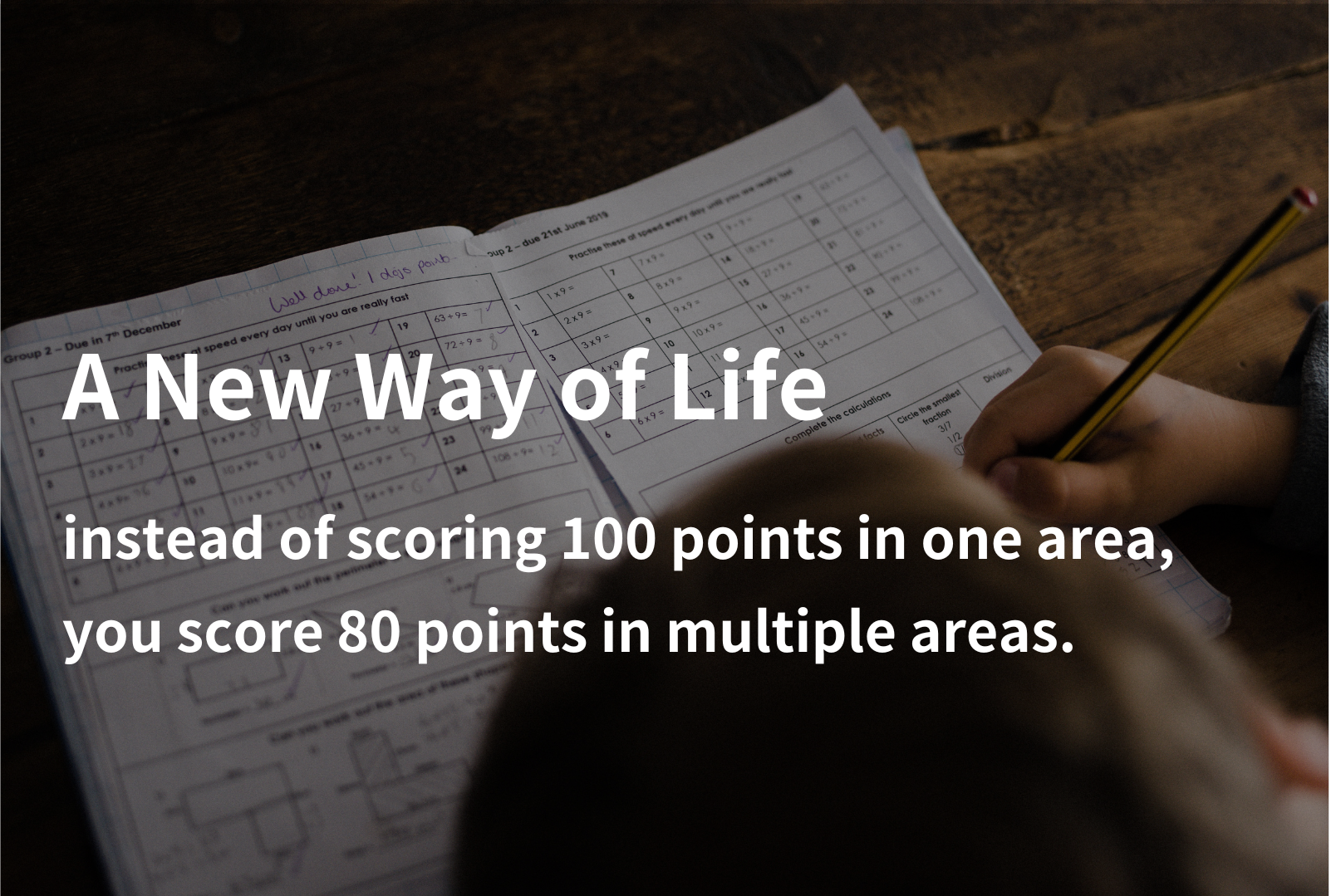
Thank you for reading my blog.
What kind of life do you envision?
Some of you may have a clear picture of the kind of life you want to lead and the kind of person you want to be.
On the other hand, some may not have such a clear picture.
The latter may be more common.
Whatever the case may be, I would like to propose one guideline for your way of life.
So, this time, I would like to propose a new way of life: instead of scoring 100 points in one area, you score 80 points in multiple areas.
Now, let’s see “scoring 80 points in multiple areas” means and what the benefits are.
A new way of life: scoring 80 points in multiple areas
Specialists are experts in their field.
An obvious example would be a doctor, lawyer, university professor, architect, or craftsman of traditional arts and crafts.
A generalist, on the other hand, is someone who does not specialize in a particular field or has multiple areas of expertise.
For example, a founding president or entrepreneur could be considered a generalist.
Many founding presidents and entrepreneurs cover a wide range of areas, from product and service development to finance and accounting, human resources, and even marketing.
“Scoring 80 points in multiple areas” is similar to the concept of a generalist.
For example, focusing on one field, IT, and aiming for a score of 100 in that field is a specialist way of life and way of thinking.
On the other hand, if one is a generalist and aims to score 80 points in each of the three fields, including design and marketing, as well as IT, even though it may be difficult to achieve 100 points in all fields, it is a generalist way of life and way of thinking.
You may have heard of the terms specialist and generalist.
Rather than focusing on one field and mastering it, a way of life in which you try and study whatever you want to do is a way of life in which you “score 80 points in multiple areas”.
Four advantages of the “scoring 80 points in multiple areas”
If I were asked to choose between being a specialist or a generalist at this point, I would choose to be a generalist.
In other words, I would choose to score 80 points in multiple areas.
Of course, I am not denying the specialist lifestyle at all.
In fact, I envy you that you have something you want to master.
However, what I want to say this time is that aiming to be a specialist is not the only correct answer.
And it is better not to try to become a specialist when you cannot think of becoming one.
There are four reasons for this.
1.Outperforms specialists in overall score.
Let’s use the previous example and think about it.
Let’s say you are an IT professional with a score of 100.
On the other hand, let’s say you score 80 points each in IT, design, and marketing. Your overall score is 240 points.
If you focus on the IT field, the former is superior, but if you consider the total score, the latter is superior, isn’t it?
Indeed, this may be too simplistic a way of thinking.
It is not easy to score skills.
However, many of you may be convinced that this is not a wrong way of thinking.
If you can bring your favorite field to a total score competition, you can have fun and never lose to a professional.
2.You can make “chemical reactions”.
The experience and knowledge you have in multiple fields allows you to create chemical reactions in your mind that integrate the fields.
For example, what is common in IT may be novel in the field of marketing, and just a little application in marketing could create a new idea.
Steve Jobs famously said in one of his speeches, “Connecting the dots,” and he was able to apply the calligraphy class he happened to be interested in during his college days when he was developing the first Macintosh.
Jobs used his knowledge of calligraphy to create the world’s first computer with beautiful typography built in.
If Jobs had not learned calligraphy, we might not have computers with the many fonts we now take for granted.
We, too, can create new ideas by “connecting the dots,” if not to the extent that Jobs did.
It may be difficult to do this by mastering just one thing, but it becomes easier if we have interests in multiple fields.
The more far apart the fields are, the more interesting chemical reactions will occur.
3.It’s hard to find something that makes you want to aim for 100 points.
Few people in their teens, or even those in their 20s and 30s, have something they want to master.
In such a situation, it is not easy to focus on a single field, and if you focus on one field, you will end up picking up possibilities in other fields.
It would be better to try a variety of things, and if there is something you want to master, you should master it.
It is always possible to become a specialist from a generalist.
4.Becoming a specialist takes time and competition is fierce.
Mastering any field, no matter what it is, takes a great deal of time.
It may take a lifetime to master it, as the field itself is bound to evolve.
In addition, competition in a single field is much fiercer.
You will never be able to catch up with those who are older and more experienced than you.
There are many excellent people in your generation.
At such times, if you have the awareness of having more than one 80-point field, you will not have to be aware of the competition.
The combinations of 80-point fields are infinite.
It could be a combination of “Accounting x Nutrition x English.”
It could be “Math x Training x Interior Design.”
I do not know what you can do with the above combinations.
But if you can do a combination that others have not done, you will be unique and become a leading expert.
–Postscript–
In this issue, we have discussed the way of life of scoring 80 points in multiple areas and the merits of this way of life.
Isn’t it an interesting way of thinking and living that is not bound by the conventional way of life?
In the future, it will become the standard for each individual to pursue his or her own new way of life without being bound by the past.
Let me conclude with a few words from Steve Jobs.
You can’t connect the dots looking forward; you can only connect them looking backwards. So you have to trust that the dots will somehow connect in your future.
Thank you again for reading to the end of this issue.
See you in my next post!



Comments